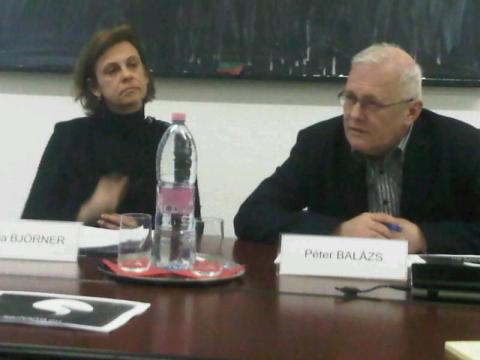Event Report - Experiences of the Swedish EU Presidency

On 25 January the Center for EU Enlargement Studies (CENS) in cooperation with the Department of International Relations and European Studies (IRES) and the Swedish Embassy in Budapest, hosted a lecture by Swedish Ambassador to Budapest Cecilia Bjorner , entitled “Experiences of the Swedish EU presidency.”
Peter Balazs, Director, CENS, in his opening speech welcomed the audience and emphasized the high-standard of the Swedish EU presidency in the second half of 2009 before the Lisbon Treaty ratification.
Cecilia Bjorner started her lecture by recalling the vision the Swedish presidency had for the EU: aiming at being strong and effective, while being open, responsive and results-oriented. She reflected that it was difficult to achieve this, since at the time there were several institutional issues at stake (e.g. the European Parliament, Commission and Lisbon Treaty). She continued with a historical insight: first, the Swedish presidency had begun under the newly elected Parliament; second it was not certain whether the presidency would be carried out under the Lisbon Treaty; third the second referendum in Ireland regarding the acceptance of the Lisbon Treaty was taking place. The two main challenges were economy/employment and climate change, as well as the EU, its neighborhood and the world in which Sweden proved to be the key actor in helping to resolve the maritime border dispute between Croatia and Slovenia.
Cecilia Bjorner emphasized that the 2009 Swedish presidency is generally regarded as having been successful because of the fact that the preparation period lasted for two years, and resulted in the initial setting of goals matching the final results. The Swedish presidency furthermore managed to implement its priorities, namely to bring the EU’s agenda forward in all areas, and to represent the EU well with international institutions and countries worldwide. She pinpointed the methods that proved crucial for the prosperous Swedish presidency: first, preparations and goal-setting; second, communication (official website, communication with people and other countries); third, concentration on several main issues; forth, centralization in Brussels as the key hub for negotiation processes.
In the question and answer session following the lecture, Ambassador Bjorner replied to enquiries regarding the outset and initial critics of the current Hungarian EU presidency, stating that it was too early to give any predictions, and that the country’s internal affairs should not affect the country’s performance on the EU and international scene.
